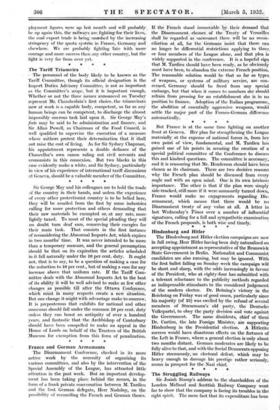Sir George May and his colleagues are to hold the
trade of the country in their hands, and unless the experience of every other protectionist country is to be belied here, they will be assailed from the first by some industries calling for more protection and others demanding that their raw materials be exempted or, at any rate, more lightly taxed. To most of the special pleading they will no doubt turn deaf ears, conserving their energies for their main task. That consists in the first instance of reconsidering the Abnormal Imports Act, which expires in two months' time. It was never intended to be more than a temporary measure, and the general presumption should be that on its expiration the articles scheduled in it fall naturally under the 10 per cent. duty. It ought not, that is to say, to be a question of making a case for the reduction to 10 per cent., but of making a case for any increase above that uniform rate. If the Tariff Com- MitMe deals with the Abnormal Imports Act to the best of its ability it will be well advised to make as few' other
changes ' till after the Ottawa Contemn" ce, which- must in many respects create a new situation. But one change it might with advantage make to-morrow. It is preposterous that exhibits for national and other museums should fall under the common 10 per cent: duty unless they can boast an antiquity of over a hundred years, and. fantastic that the Archbishop of Canterbury should' have been compelled to make an appeal in the House of Lords on behalf of the Trustees of the British Museum for exemption from this form of penalization.
* * * *


















































 Previous page
Previous page